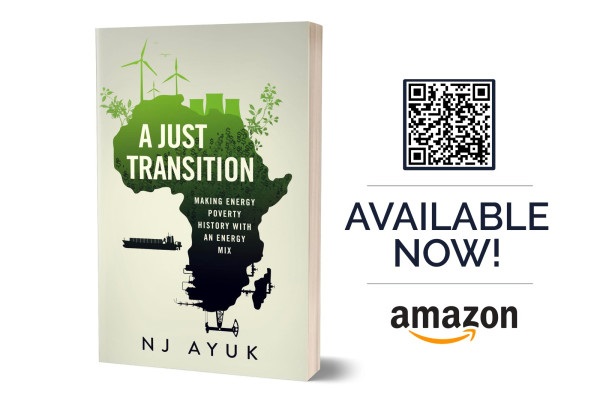Entrepreneur, attorney and best-selling author NJ Ayuk releases book on ending Africa’s energy poverty
Kampala, Uganda | THE INDEPENDENT | Entrepreneur, attorney and best-selling author NJ Ayuk has officially released his most recent book, titled ‘A Just Transition: Making Energy Poverty History with an Energy Mix.’ The book is now available to purchase on Amazon.
Representing the third publication released by the best-selling author, the book sheds light on the sobering reality that is unfolding in Africa’s energy sector.
Following years of diligent research and in-depth analysis, the book sheds light on the sobering reality that is unfolding as the International Energy Agency’s (IEA) ambitious green energy policies continue to stifle and cripple energy economies across Africa.
While the rest of the world is faced with one, momentous crisis: climate change, Africa is faced with two: climate change and energy poverty. In pursuit of addressing the impacts caused by the climate crisis, world leaders have put in place the Paris Agreement, designed to keep global temperatures from rising in the long-term through the immediate transition to renewable energies.
As the continent which faces the harshest impacts of the climate crisis, the immediate transition will result in Africa lacking the chance to develop, providing the over 600 million people currently without access to electricity with reliable energy, while at the same time standing to bear a disproportionate share of the consequences of climate change. Simply put, this immediate transition called for with the Paris Agreement will have devastating impacts on Africa.
Against this backdrop, the book’s overall objective is to answer a series of important questions. Firstly, Africa bears a disproportionate share of not only the anticipated future problems of climate change, but the present-day, here-and-now problem of energy poverty. So, what should we do? Should we prioritize the goal of preventing climate change over the goal of addressing energy poverty? Or should we focus on ways to deliver power to the hundreds of millions of Africans who currently lack access to electricity? Obviously, we should try to achieve both objectives. Both are important. But how do we do this? And which should come first?
The book investigates the best way forward for transitioning to a cleaner energy future while prioritizing Africa’s socioeconomic prosperity. The answer put forward by the IEA being that renewables are the solution to Africa’s energy poverty. However, as the book details, this is simply not true. Renewable technologies cost more than most African countries can bear to pay, and while the global community has offered to help the continent make the transition, international pledges have consistently fallen short, with Africa and other developing regions still waiting to receive the assistance they were promised.
Ayuk posits Africa can approach the energy transition in its own way. In his pursuit for an answer to the aforementioned questions, Ayuk considers the role natural gas will play in achieving dual objectives of energy transition and economic prosperity in Africa. By looking at the quantities of gas in Africa, Ayuk makes a strong case for utilization of this fuel, with details given into its role in other economies, opportunities for development in Africa and why Ayuk recommends gas over other resources.
What separates the book from other energy-focused publications is that it is rooted in what Africa needs. Ayuk emphasizes that Africa needs to chart its own destiny; make its own choices; and decide whether to use its own resources. Simply put, Africa’s journey to economic prosperity starts with gas.
‘A Just Transition: Making Energy Poverty History with an Energy Mix’ is available for purchase on Amazon
 The Independent Uganda: You get the Truth we Pay the Price
The Independent Uganda: You get the Truth we Pay the Price




